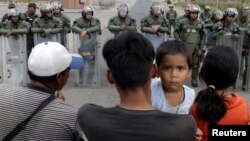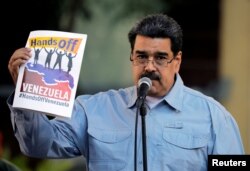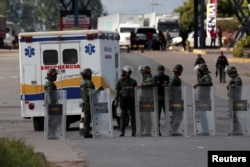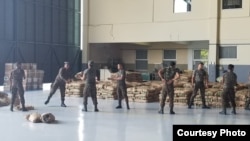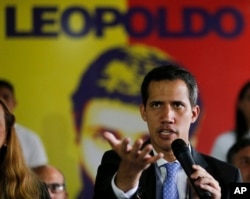At least two civilians have died in Venezuela and about a dozen more were injured in a confrontation with security forces near the national border with Brazil Friday.
Reports say the incident took place in the Gran Sabana region, along Venezuela’s southeast border with Brazil, home to the Pemon indigenous group.
Witnesses say people there were protesting disputed President Nicolas Maduro’s efforts to keep humanitarian aid out of the country.
A local official told the Associated Press that members of the Pemon ethnic group clashed with the Venezuelan National Guard and the army as security forces moved tanks to the border with Brazil.
Witnesses say the security forces used tear gas and bullets while the demonstrators fought back with arrows and rocks.
The White House said in a statement late Friday that the U.S. “strongly condemns the Venezuelan military’s use of force against unarmed civilians and innocent volunteers on Venezuela’s border with Brazil.” The statement also said: “Egregious violation of human rights by Maduro and those who are following his orders will not go unpunished.”
A U.S. diplomatic official in the area said news of the violence has traveled to a Brazilian military base just across the border, where U.S. and Brazilian aid donations are waiting to be delivered Saturday.
Ambulances from Venezuela are reportedly being allowed to cross into Brazil to get medical care for the injured, since little care is available on the Venezuelan side of the border.
Transport of aid is scheduled to begin Saturday. In addition to the supplies at the Brazilian border, tons of food, medicine and other aid, primarily from the United States, are sitting in warehouses on the Colombian side of a bridge to Venezuela.
Maduro refuses the aid, saying Venezuela is not a nation of “beggars.” He has said he considers the aid the first stage of a U.S. invasion.
U.S.-backed interim president Juan Guaido has vowed to get the aid through Saturday, despite the threat of military force.
As head of the opposition-led National Assembly, Guaido invoked the constitution to declare himself interim president after saying Maduro’s reelection last year was a sham.
The United States was the first to recognize Guaido as Venezuelan president, followed by about 50 other nations.
Maduro has offered to meet with Guaido, but is refusing to step down or call for early elections.
The collapse in global energy prices, corruption and failed socialist policies have left oil-rich Venezuela’s economy in a shambles.
More than 3 million people have fled the country and its severe shortages of food, fuel and basic goods.




